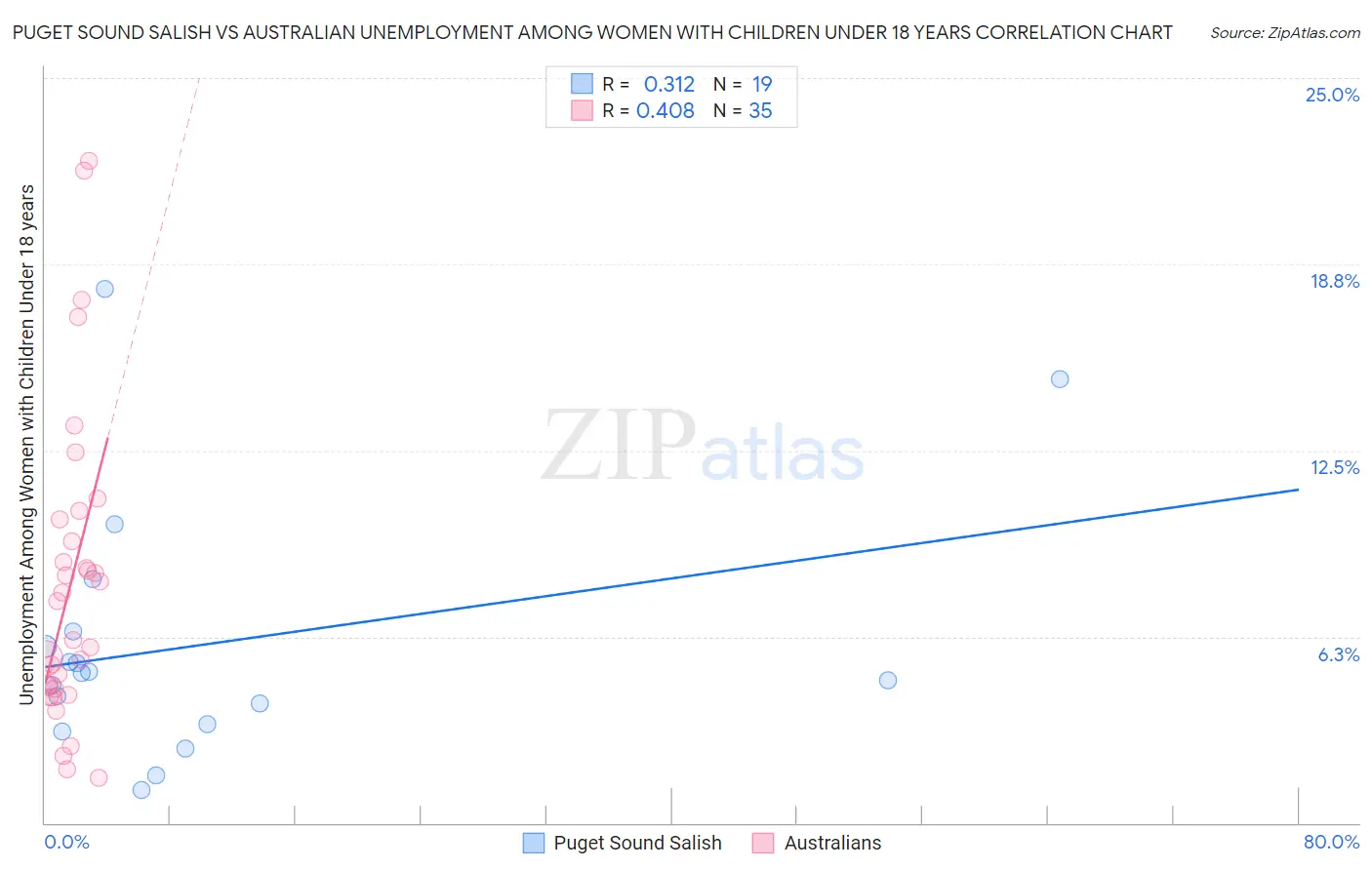Puget Sound Salish vs Australian Unemployment Among Women with Children Under 18 years
COMPARE
Puget Sound Salish
Australian
Unemployment Among Women with Children Under 18 years
Unemployment Among Women with Children Under 18 years Comparison
Puget Sound Salish
Australians
5.1%
UNEMPLOYMENT AMONG WOMEN WITH CHILDREN UNDER 18 YEARS
95.8/ 100
METRIC RATING
76th/ 347
METRIC RANK
5.2%
UNEMPLOYMENT AMONG WOMEN WITH CHILDREN UNDER 18 YEARS
95.1/ 100
METRIC RATING
84th/ 347
METRIC RANK
Puget Sound Salish vs Australian Unemployment Among Women with Children Under 18 years Correlation Chart
The statistical analysis conducted on geographies consisting of 45,346,755 people shows a mild positive correlation between the proportion of Puget Sound Salish and unemployment rate among women with children under the age of 18 in the United States with a correlation coefficient (R) of 0.312 and weighted average of 5.1%. Similarly, the statistical analysis conducted on geographies consisting of 217,962,956 people shows a moderate positive correlation between the proportion of Australians and unemployment rate among women with children under the age of 18 in the United States with a correlation coefficient (R) of 0.408 and weighted average of 5.2%, a difference of 0.30%.

Unemployment Among Women with Children Under 18 years Correlation Summary
| Measurement | Puget Sound Salish | Australian |
| Minimum | 1.1% | 1.5% |
| Maximum | 17.9% | 22.2% |
| Range | 16.8% | 20.7% |
| Mean | 6.0% | 8.1% |
| Median | 5.0% | 7.4% |
| Interquartile 25% (IQ1) | 3.3% | 4.5% |
| Interquartile 75% (IQ3) | 6.4% | 10.2% |
| Interquartile Range (IQR) | 3.1% | 5.7% |
| Standard Deviation (Sample) | 4.3% | 5.2% |
| Standard Deviation (Population) | 4.1% | 5.1% |
Demographics Similar to Puget Sound Salish and Australians by Unemployment Among Women with Children Under 18 years
In terms of unemployment among women with children under 18 years, the demographic groups most similar to Puget Sound Salish are Zimbabwean (5.1%, a difference of 0.020%), Immigrants from Asia (5.1%, a difference of 0.030%), Assyrian/Chaldean/Syriac (5.1%, a difference of 0.040%), Immigrants from Northern Europe (5.1%, a difference of 0.060%), and Immigrants from Croatia (5.1%, a difference of 0.060%). Similarly, the demographic groups most similar to Australians are Maltese (5.2%, a difference of 0.0%), Romanian (5.2%, a difference of 0.10%), Paraguayan (5.2%, a difference of 0.11%), Immigrants from Indonesia (5.2%, a difference of 0.12%), and Immigrants from Lithuania (5.2%, a difference of 0.15%).
| Demographics | Rating | Rank | Unemployment Among Women with Children Under 18 years |
| Icelanders | 96.6 /100 | #70 | Exceptional 5.1% |
| Serbians | 96.5 /100 | #71 | Exceptional 5.1% |
| Immigrants | Bolivia | 96.1 /100 | #72 | Exceptional 5.1% |
| Albanians | 95.9 /100 | #73 | Exceptional 5.1% |
| Immigrants | Northern Europe | 95.9 /100 | #74 | Exceptional 5.1% |
| Immigrants | Asia | 95.8 /100 | #75 | Exceptional 5.1% |
| Puget Sound Salish | 95.8 /100 | #76 | Exceptional 5.1% |
| Zimbabweans | 95.7 /100 | #77 | Exceptional 5.1% |
| Assyrians/Chaldeans/Syriacs | 95.7 /100 | #78 | Exceptional 5.1% |
| Immigrants | Croatia | 95.6 /100 | #79 | Exceptional 5.1% |
| Bolivians | 95.5 /100 | #80 | Exceptional 5.1% |
| Immigrants | Lithuania | 95.4 /100 | #81 | Exceptional 5.2% |
| Romanians | 95.3 /100 | #82 | Exceptional 5.2% |
| Maltese | 95.1 /100 | #83 | Exceptional 5.2% |
| Australians | 95.1 /100 | #84 | Exceptional 5.2% |
| Paraguayans | 94.8 /100 | #85 | Exceptional 5.2% |
| Immigrants | Indonesia | 94.8 /100 | #86 | Exceptional 5.2% |
| Laotians | 94.7 /100 | #87 | Exceptional 5.2% |
| Immigrants | Scotland | 94.5 /100 | #88 | Exceptional 5.2% |
| Immigrants | Turkey | 94.2 /100 | #89 | Exceptional 5.2% |
| Ukrainians | 93.8 /100 | #90 | Exceptional 5.2% |